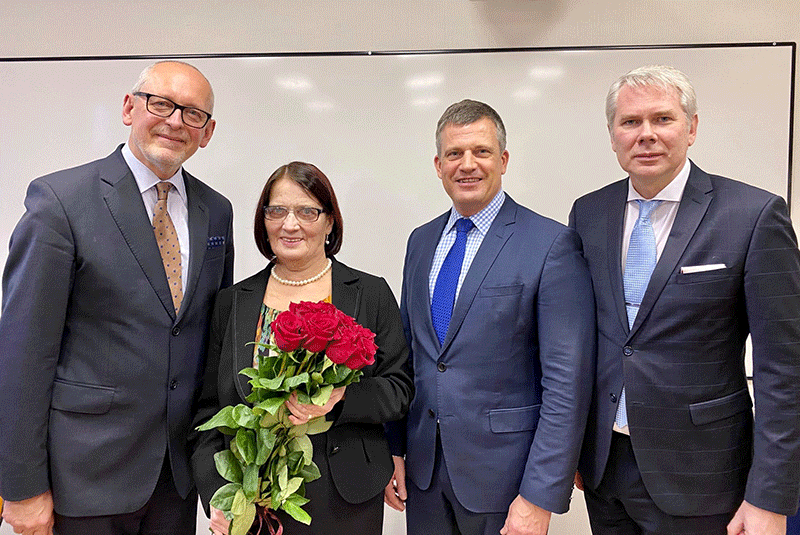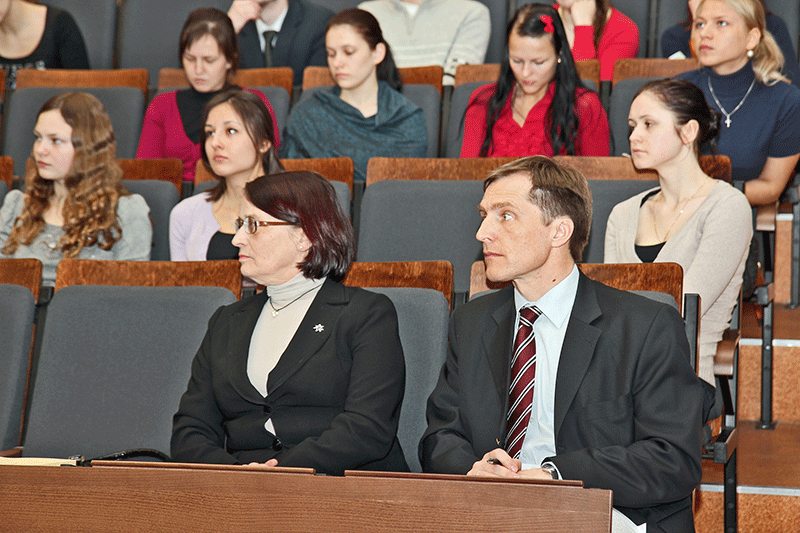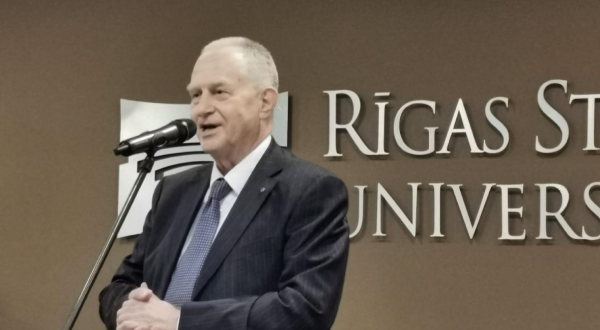Psychiatrist and RSU Prof. Emeritus Biruta Kupča: ‘Mental Health Needs the Same Attention as Physical Health’
Associate Professor and psychiatrist Biruta Kupča had been working for Rīga Stradiņš University (RSU) for nearly 50 years and was granted the title of Professor Emeritus at the end of last year. This was an excellent reason to invite the professor to have a conversation about her studies, psychiatry and mental health. 
On 18 December 2019, RSU Professor Emeritus Biruta Kupča was congratulated on a significant anniversary. From the left: Rector Prof. Aigars Pētersons, Professor Emeritus Biruta Kupča, Vice-rector for Administration and Development Toms Baumanis and Vice-Rector for Health Studies Prof. Guntis Bahs
The idea that it is important to take care of one’s mental health as well as one’s physical health is gaining more traction these days.
To care for one’s mental health ‘it is essential to avoid all factors that might contribute to the development of mental illnesses, such as alcohol, smoking and drugs. And you have to live well! This means that you should be both mentally and physically active and surround yourself with family, friends and acquaintances who understand you and with whom you can share your feelings,’ says psychiatrist Biruta Kupča.
What myths and prejudices are there about mental illnesses and psychiatry?
I think that there are a lot of myths and prejudices, because it was almost impossible to treat mental illnesses in the past. Pharmacology is developing, however, and there is an expanding range of medical products available for the treatment of mental illnesses. It is therefore increasingly possible to help patients. There is currently a lot of research being done on the brain, which is leading to new discoveries and new substances being synthesised all the time. We now also have technologies available to us that we didn’t in the past, which allow us to get a better understanding of symptoms and patients.
Another problem in psychiatry is that patients with mental disorders are often not aware that they have a mental disorder and who therefore criticise and reproach doctors for treating them unnecessarily.
There is also prejudice because of the way that patients with mental illnesses behave and react to their surroundings, which is often very different from the way other people do. Their thoughts and behaviour can seem strange and inadequate compared to what people are used to. Assurances and education alone does not radically change social attitudes towards these people and so different types of prejudices still persist. Prejudices are, however, decreasing.
Many people believe that therapy is unnecessary thinking that they need to be able to handle their problems themselves.
Yes, that is another prejudice in our society. Going to therapy or consulting a psychotherapist is a conversation with a professional and because they have a very good knowledge of psychological processes they can explain many things that can help people understand themselves better. It is definitely a helpful step towards improved mental health.
Have you understood yourself?
[Laughs] Sometimes I do understand myself, sometimes I don’t. The theory, which I know very well, is one part, but another is what happens in real life. I often find myself wondering why I acted a certain way, or assessed something in that exact way.
What are some new discoveries in psychiatry that you have implemented in your work?
Medication is important in a psychiatrist's practice and new medicine is being developed every year. Treating depression used to be rather limited in the past yet now there are so many antidepressants that you can find what is most suitable and effective for each patient. There is also a wide, ever-expanding range of antipsychotic medication.
Furthermore, medicine is developed to have as little side effects as possible to avoid causing any adverse effects on a patient’s health, and this is something pharmacologists pay a lot of attention to when developing new medication.
There is a saying that there’s a fine line between genius and insanity...
I don't think that this is entirely true. Mental illness does change a person’s way of reasoning and evaluating the world, yet it often results in something special. Many painters, poets and other artists create interesting work owing to their peculiar viewpoint. Being different is what makes them fascinating to other people. Yet it doesn’t mean that all geniuses have mental illnesses.
What do we still not understand about the human psyche?
The structure and function of the brain is so intricate that new discoveries are made every year.
What questions about mental illness have you personally not found answers to?
I think that not only I, but all psychiatrists wonder why certain medication helps one patient to recover, or get better, but does not help another. This seems to indicate that there are features of the brain that are still not fully researched and understood.
Why did you choose to study medicine and specialise in psychiatry?
Medicine was very popular when I was young. Medicine studies were highly regarded and it was an honour to work as a doctor. I enrolled at the Riga Medical Institute (now - RSU) in 1958.
A photograph from the newspaper Padomju Mediķis dated 18 January 1960. From the left: Students from the Riga Medical Institute, Biruta Kupča (née Dupate) and Ilze Cīrule, after an exam. From the RSU Museum archive.
I was already familiar with psychiatry, because I worked as an occupational therapy instructor at a psychiatric hospital for a year after graduating from secondary school. I also worked at a psychiatric hospital in my spare time during my study years. When something is familiar it seems interesting. Moreover, my colleagues at the hospital tried to persuade me to become a psychiatrist rather than a surgeon, which I was considering, because they said that being a surgeon is a tough job and not suitable for a woman.
What are some of your memories from studying at the Riga Medical Institute?
The first positive memories I have are about the drama collective that I was involved in. Elza Baltaisvilka was the director of this collective. I remember performing with Aleksei Arbuzov’s play Klejojumu gadi at the theatre that is now the Mikhail Chekhov Riga Russian Theatre. The people in the collective were very interesting, intelligent people many of whom later became famous doctors. The institute's lecturers were also a part of this collective and acted in plays, for example the surgeon and anatomist Haralds Voskis.
Members of the Riga Medical Institute's drama collective after a performance of Aleksei Arbuzov’s play Klejojumu gadi. Biruta Kupča (née Dupate) (1st row, 2nd from the right) in the role of Gaļina. Director Elza Baltaisvilka (1st row, 3rd from the left). Around 1960. From the RSU Museum archive.
For a while during my studies I was very interested in surgery, and I was even the head of the surgery interest group.
There was a lot of competition when I applied to the institute. I had to write an essay and pass exams in physics and chemistry.
Which subjects were the most difficult when you were studying?
I didn’t like the subjects where I had to learn material by heart. One of these subjects was anatomy. Later there were new subjects where I could use logic to think through and understand everything, and I didn’t really need to learn everything by heart.
Graduation party of the Riga Medical Institute in 1964. Couple on the right — graduates Biruta Kupča (née Dupate) and Jānis Kupčs. From the RSU Museum archive.
Which lecturers or colleagues do you consider to have been your teachers in psychiatry?
Firstly, the doctors that I worked with at the psychiatric hospital right after graduating from secondary school — Dr Zenta Graudiņa and Dr Mirdza Upeniece. They were good specialists and role models for me in practical psychiatry. After graduating from the institute I started working at the Strenči Psycho-Neurological Hospital where Dr Pēteris Grave encouraged me to engage in science. Afterwards I worked for the Department of Psychiatry of the Riga Medical Institute managed by Professor Mintauts Caune who was my biggest guide and mentor.
What is the focus of your current scientific research?
Recently I have been involved in researching the treatment of depression, but I am currently doing less science-related work. My latest research in 2019 was about the work Latvian psychiatrists did with the 1905 revolutionaries. Many of the revolutionaries ended up at what is now the Riga Psycho-Neurological Hospital after the events of 1905. I was encouraged to research this topic by historians.
In the foreground: Assoc. Prof. Biruta Kupča and Prof. Elmārs Rancāns, Head of the Department of Psychiatry and Narcology, at the RSU Scientific Conference in 2012.
This year is the 70th anniversary of RSU. What would you wish for your university?
I wish the lecturers success in educating students in such a way that they wouldn’t have any desire to leave Latvia to look for greener pastures. We have to do everything possible to encourage young specialists to stay here!
Facts about Biruta Kupča
- Professor Emeritus of the Department of Psychiatry and Narcology at the Faculty of Medicine.
- Working at RSU since 1973.
- Graduated the Riga Medical Institute In 1964.
- The subject of Biruta Kupča’s 1978 dissertation was circular inferences in schizophrenia.
- The research paper was focused on the affective disorder clinic and treatment methods.
- Vice-President of the Latvian Psychiatric Association since 2005.
- Member of the Certification Commission of the Latvian Psychiatric Association since 1998.
- Awards: Croix de la reconnaissance (2010), Latvian Physician Association award Tempus Hominis (2010), and others.
- Co-author of 14 books and brochures.
- Supervising tutor of 22 student research papers.





